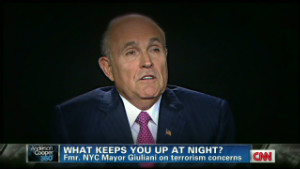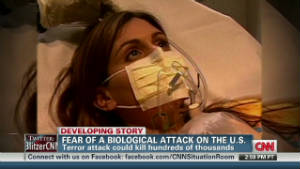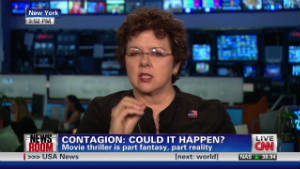Editor's note: Laurie Garrett is senior fellow for global health at the Council on Foreign Relations and a Pulitzer Prize-winning journalist.
(CNN) -- Try this for a spine-tingling moment: An immensely popular novelist who specializes in eerie, conspiratorial mysteries portrays an evildoer who is, gulp, an awful lot like yourself. And the word "popular" doesn't really come close to describing this novelist, whose every book is launched in multiple languages and shoved into movie production (starring Tom Hanks) before the manuscript is bound in hard copy.
It's Dan Brown, whose "Inferno," the latest tale of Robert Langdon, the Harvard iconographer-turned-homicide-hunter, hinges on the deeds of a dastardly biologist who kidnaps the director general of the World Health Organization and compels her to heed his insanity while locked inside the Council on Foreign Relations in Manhattan.
I am the only trained biologist working in the New York headquarters of the Council on Foreign Relations, where I am senior fellow for global health. I've never kidnapped WHO Director-General Dr. Margaret Chan, but I have been known to corner her for some whispered one-on-ones.
 Laurie Garrett
Laurie Garrett The day after "Inferno" was launched with the usual Dan Brown-associated brouhaha, my brother e-mailed "OMG!" telling me he was devouring the thing on his e-reader. All day long I received notes from worried friends and family, concerned that Brown's conspiracy-minded readership would turn its sights on the council, or me, and my global health work.
Brown's ability to raise this kind of intrigue was demonstrated with his first blockbuster, "The Da Vinci Code" which spawned an entire genre of dark Vatican-oriented novels that imagine self-mutilating, power-grabbing monsters lurking in medieval dungeons beneath St. Peter's Basilica. With "Angels and Demons," Brown had millions of readers convinced that an 18th-century group called The Illuminati was secretly pulling strings of power all over the world, the group allegedly (in Internet conspiracy canon) dominated by David Rockefeller and his pals at ... you guessed it, the Council on Foreign Relations.
So it was with more than a little trepidation that I opened "Inferno" on my Kindle.
I can now report that Dan Brown has produced a silly, but interesting and provocative book, delving into biologist Paul Ehrlich's old "Population Bomb" ideas, synthetic biology, dual-use research, human genome alteration and even hypothetical germ line mutation of people. Perhaps Brown has grown bored with only castigating Catholicism, for he now chucks his aspersions on science. Of course it's not realistic or accurate science, given the author's penchant for mixing Dante's 14th-century poem "Inferno" with 21st-century gene sequencing.
Dante's original "Inferno" guided readers through the most explicit journey of hell and purgatory ever committed to paper. Brown's "Inferno" takes a 21st-century spin through a hell of man-made microbes, pandemics and human overpopulation. The Brown hell is just close enough to the edges of biological reality to make for thriller reading. Biology as a discipline is indeed delving into human-directed evolution and creation of life forms in ways that ought to be scrutinized. And while the real work of science is not dark and genocidal, as Brown portrays, there are risks of accidental release of modified organisms and, less likely, terrorism that merit wider attention.
For those who fear Brown's version of inferno might come true, here is some spoiler-alert news from the real world. The private C-130 that "Inferno" imagines the WHO owns, jetting about the world to stop disease, is not just a fantasy, it would be impossible. Far from affording its own jet, WHO is in deep financial straits, now facing its third year of painful budget deficits and layoffs, leaving its epidemic response division tapped-out for 2013, Chan has told me.
 Giuliani: I worry about homeland attack
Giuliani: I worry about homeland attack  Is the U.S. prepared for bioterror?
Is the U.S. prepared for bioterror?  Health expert weighs in on 'Contagion'
Health expert weighs in on 'Contagion' In Brown's imaginings, the European Union's version of the Centers for Disease Control has a huge secret SWAT team of hulking, fully armed, military-trained disease-fighters that swoop into countries, violating all local law with impunity, to stop epidemics. Of course there is no such team, nor does the budget-strained U.S. Centers for Disease Control and Prevention have Kevlar-wearing, Uzi-toting microbe hunters.
On Brown's version of planet Earth these disease-fighers have such limitless power that prime ministers immediately take their calls, and armies and police forces the world over are at their command. Margaret Chan might dream of having enough clout to command an obstinate national leader to cease covering up his country's epidemic, but in truth her only tools are persuasion, bluffing and the rage of world media. Wouldn't it be sweet if the impoverished WHO actually did have a budget large enough to finance an agency C-130 and rapid response team?
The Kindle is switched off. Back to work at the Council on Foreign Relations, trying to create and push policies that spare populations of millions the scourges of disease, malnutrition and climate change.
Follow us on Twitter @CNNOpinion.
Join us on Facebook/CNNOpinion.
{ 0 comments... read them below or add one }
Post a Comment